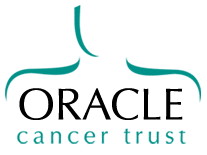Radiotherapy and/or Chemotherapy
Radiotherapy Mask
Different trusts may operate differently, but usually after diagnosis your mask is made fairly quickly following a CT scan and possibly a pet CT for the planning of radiotherapy, which again can’t be rushed. Masks are custom made to fit snugly to the contours of your head to hold you very still on the steel bed used during radiotherapy treatment. The masks are made of a rigid plastic that becomes pliable when heated in a bath of hot water. The radiographers will get you to lie down on an exact replica of the steel bed used for radiotherapy treatment, give you a neck pad and place the wet, heated mask onto your head. It feels like a hot towel on your face. They then massage the mask into your head and neck contours, ensuring it is aligned to the clips that align it to the bed. Laser traces are used to ensure you are positioned in exactly the same place for every treatment and a tattoo dot is applied to your chest to aid this alignment. Your mask and neck pad is retained by the radiographers for use throughout your treatment, but you are allowed to take the mask home at the end!
General Information
A quick overview of what to expect
Surgery
A quick overview of what to expect
You may want to ask for eyeholes to be cut into your mask when being made (if your trust will allow this).
Eating and Feeding Tubes
Your NHS trust will suggest different options for eating during and immediately after your treatment. It is likely you will experience swallowing difficulties due to the treatment regime. A feeding tube is usually recommended. These tubes deliver a liquid nutrition formula directly into your digestive system. Your doctor or dietitian will choose a formula tailored to your needs. It contains the blend of protein, carbohydrates, fats, vitamins, minerals, and other micronutrients your body needs. You may also get liquids and medications through a feeding tube. Tubes can deliver the formula in different ways using a pump or syringe to push the food through the tube, while others rely on gravity.
Talk to your Head and Neck support team about the pros and cons of either feeding method to find the one that will suit you best. Both PEG and RIG tubes can be for short-term or long-term use although the tubes will need to be cleaned and changed regularly and this can be uncomfortable and unpleasant, so ask lots of questions about your NHS Trust policies for cleaning and changing the tube.There is also another option some trusts don’t routinely fit the above but offer the option of a nasogastric feeding tube which takes moments to fit and is inserted via your nose into tummy, then either syringe or pump fed again water and medication can go via tube.
Body Wash, Soap and Shampoo
In the week before treatment, start using body wash, soap and shampoo that is zero PH rated. This helps avoid any adverse reaction to changes in the skin caused by either the radiotherapy or the chemo. A barrier moisturising cream is also something to start applying to the area where the radiotherapy will interact, normally the throat, neck and lower face. Use it morning and night before and throughout treatment as it wards off “sun burning”, blisters and skin breakdown in the latter stages of the radiotherapy treatment. The Simple brand does a full range of soap, shampoo, body wash and creams that can be bought from most chemists and supermarkets. Usually the radiotherapy team will give you the barrier cream to use. Any other creams you use let the team know before you apply and never apply before treatment starts, always use after you’ve had that day’s treatment.
Radiotherapy/Chemotherapy Treatment time
Radiotherapy treatment takes between 7-15 minutes depending upon the machines used and if daily scans are being taken. Your mask will be securely fastened to the steel bed and the radiotherapist will align your upper body as they did during mask fitting using laser alignment. They will make you comfortable using knee rolls and your specific neck pad. It is crucial that you are aligned correctly and once in position you must lie very still. Try not to be afraid and remember that Head and Neck cancers generally respond well to radiation treatment.
Take a playlist or CD in with you to pass the time and relax you during treatment. Many trusts have CD machines, ask the staff to countdown the time for you.
Radiotherapy treatment takes between 7-15 minutes depending upon the machines used and if daily scans are being taken. Your mask will be securely fastened to the steel bed and the radiotherapist will align your upper body as they did during mask fitting using laser alignment. They will make you comfortable using knee rolls and your specific neck pad. It is crucial that you are aligned correctly and once in position you must lie very still. Take a playlist or CD in with you to pass the time and relax you during treatment. Many trusts have CD machines, ask the staff to countdown the time for you. Don’t be afraid, head and neck cancers generally respond well to radiation treatment.
If your treatment involves chemotherapy and radiotherapy (chemoradiation therapy), quite often in the first two weeks, you may not feel much different than you did prior to treatment starting. Be aware side effects can start to ramp up overnight.
If you are having Radiotherapy as part of your treatment, your first point of call every day will usually be the radiotherapy team. If you have any issues, make them aware they are the frontline in your course of treatments. Your oncology consultant will meet you regularly (weekly usually) to review how you are coping with the treatment and may prescribe medications to help you cope with treatment side effects.
Chemotherapy days can be quite long, starting early morning (8am) and finishing late afternoon (6pm), although this will be dependent on your NHS Trust and the chemotherapy drug you are on. A catheter is inserted into a vein in your hand and a regime of saline flushes and chemo drips are fed into your body. The first drip contains medications to help ward off side effects from the chemo such as sickness and gives a cold sensation up your arm. Due to the quantity of saline flushes you will feel the need to wee many times and you will be able to trundle the drips along with you to the toilet, as well as when you go for your radiotherapy treatment. The chemo itself normally starts around lunchtime and the staff on the ward will want you to have had your radiotherapy before you have the chemo as it is not to be taken off the ward. At the end of the day of chemo treatment, you will get a “goody bag” of medications to cope with the chemo side effects. The side effects tend to increase the more chemo sessions you have and everyone reacts differently so report anything that makes you feel ill, uncomfortable or unusual including hiccups. You will be given a contact number to call in an emergency and if you’re having daily radiotherapy you can see a chemo specialist or your consultant to get medications to counteract the effects of the chemo. Do not suffer in silence and if you experience raised temperature or fever you may be asked to go back to hospital as soon as possible.
During Chemotherapy, ask for a heated blanket to make your arm more comfortable.
Importance of Oral Hygiene & Hydration
Oral hygiene is vital for keeping your remaining teeth, gums and jaw as healthy as possible. You will be given duraphat toothpaste to use for rest of your life, and special PH neutral mouthwashes for during treatment and sometimes afterwards. As the radiotherapy progresses, you will notice a build up of mucous in your mouth and throat that you’ve never had before and the thickening of saliva. It’s because the water fraction of the saliva has been damaged by the radiotherapy and only mucous is produced. The following things can help. Drink lots. Use a nebuliser several times in the day to loosen the thick secretions - the Head and Neck nurses should be able to organise a nebuliser for you. Keep a humidifier by the bed. Some people are helped by a drug called carbocysteine which thins the mucous down.
Exercise and Rest
Exercise and rest are crucial for your treatment to be successful. Your body is going to take a significant amount of punishment from the treatment so be prepared to have daytime sleeps and rest. Regular exercise when you feel most perky in the day is good for your mental and physical health even if it is simply walking around the block once a day.
What To Expect



